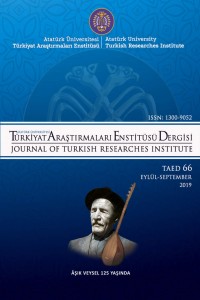Abstract
Abstract
Michel Foucault, who is involved in the poststructuralist thought that expresses a radical break from the old philosophical traditions in the Continental European tradition of the 20th century, rejects the thought of a self or a basic self which has a rational structure. Not only does it reject the subject which has a rational structure, but it also rejects any pattern that is imposed by “normal” ideas and absolute social structures. While doing so, he uses an archaeological method which aims to show intellectual structures or historical a priori. Foucault, especially in the early 1960s, develops an information archeology that evaluates discourse formations. In this way, he analyzes information systems within the framework of an anti-humanist approach. He believes that it is essential for love to have historical restrictive assumptions in order to explain the establishment of information, discourses, and object areas without referring to a transcendent subject. By interacting different dimensions in different areas, he tries to obtain the general emergence of the discourse of knowing. For this purpose, in this article, as Foucault attempts to make an analysis as an archaeologist, the knowledge, the basic where knowledge is made possible, the historical a priorical structuring of the thought, through which elements the knowledge is established, the understanding of knowledge characterizing the thought of a period have been examined.
References
- Baudelaire, C. (1965). The Painter of Modern Life and Other Essays, (Ed. and Trans. Jonathan Mayne), London: Phaidon, 1965. Bidet, J. (2016). Foucault’yu Marx’la Okumak, çev. Zehra Cunillera, Metis Yayıncılık, İstanbul. Burgelin, P. (2002). “Bilginin Arkeolojisi”, Urhan, Veli- Gündoğdu, Hakan, “(Derleme ve Tercüme) Foucault ve Bilginin Arkeolojisi”, Foucault ve Bilginin Arkeolojisi”, Paradigma Yayınları, İstanbul. Cevizci, A. (2011). Felsefe Tarihi: Thales’ten Baudrillard’a, Say Yayıncılık, İstanbul. Deleuze, G. (2002). Yeni Bir Arşivci, çev. Veli Urhan, Hakan Gündoğdu, Paradigma Yayınları, İstanbul. Foucault, M. (1999). Bilginin Arkeolojisi, çev. Veli Urhan, Birey Yayıncılık, İstanbul. Foucault, M. (2007). Büyük Kapatılma, çev. Işık Ergüden, Ferda Keskin, Ayrıntı Yayınları, İstanbul. Foucault, M. (1993). Ders Özetleri 1970-1982, çev. Selahattin Hilav, Yapı Kredi Yayınları, İstanbul. Foucault, M. (2012). İktidarın Gözü, çev. Işık Ergüden, Ayrıntı Yayınları, İstanbul. Foucault, M. (2001). Kelimeler ve Şeyler, çev. Mehmet Ali Kılıçbay, İmge Kitabevi, Ankara. Foucault, M. (2014). Özne ve İktidar, çev. Osman Akınhay, Ed. Ferda Keskin, Ayrıntı Yayınları, İstanbul. Foucault, M. (2015). Öznenin Yorumbilgisi, çev. Ferda Keskin), İstanbul Bilgi Üniversitesi Yayınları, İstanbul. Foucault, M. (1987). Söylemin Düzeni, çev. Turhan Ilgaz, Hil Yayınları, İstanbul. Foucault, M. Gutma, H. Hutton, P. H. (2001). Kendini Bilmek, çev. Gül Çağalı Güven, Om Yayınevi, İstanbul. Harvey, D. (2006). Postmodernliğin Durumu: Kültürel Kökenlerin Değişimi, çev. Sungur Savran, Metis Yayınları, İstanbul. Paras, E. (2016). Öznenin Yitiminden Yeniden Doğuşuna, çev. Yunus Çetin, Kolektif Kitap Bilişim ve Tasarım Ltd. Şti., İstanbul. Revel, J. (2012). Foucault Sözlüğü, çev. Veli Urhan, Say Yayınları, İstanbul. Urhan, V. (1999). “Sunuş”, Bilginin Arkeolojisi, çev. Veli Urhan, Birey Yayıncılık, İstanbul.
Abstract
Öz
20. yüzyılın Kıta Avrupası geleneği içerisinde eski felsefi geleneklerden radikal bir kopuşu ifade eden postyapısalcı düşünce içinde yer alan Michel Foucault, rasyonel bir yapıya sahip öz ya da temel bir benlik düşüncesini reddeder. Sadece rasyonel bir yapıya sahip öznenin varlığını reddetmekle kalmaz, aynı zamanda “normal” diye dayatılan düşüncelerin, mutlak toplumsal yapılanmaların nitelediği her türlü kalıbı reddeder. Bunu yaparken de entelektüel yapıları veya tarihsel a priorileri göstermeyi amaçlayan arkeolojik bir yöntem kullanır. Foucault özellikle 1960’lı yılların başında söylem oluşumlarını değerlendiren bir bilgi arkeolojisi geliştirir. Bu sayede bilgi sistemlerini, anti-hümanist bir yaklaşım çerçevesinde çözümler. Aşkın bir konumda bulunan özneye gönderme yapmadan bilgilerin, söylemlerin ve nesne alanlarının kurulmasını açıklayabilmemiz için tarihsel sınırlayıcı önkabullerin bulunmasının elzem olduğuna inanır. Birbirinden ayrı, değişik alanlardaki değişik boyutları etkileşim içine sokarak; belirli bir anda, bilme söylemlerinin, genel olarak ortaya çıkışlarını elde etmeye çalışır. Bu amaçla makalede, Foucault’un bir arkeolog edasıyla analizini yapmaya giriştiği, bilgi, bilginin mümkün kılındığı temel, düşüncelerin tarihsel a priorik yapılanmaları, bilginin hangi unsurlar aracılığıyla tesis edildiği, bir dönemin düşüncesini karakterize eden bilgi anlayışları incelenmiştir.
References
- Baudelaire, C. (1965). The Painter of Modern Life and Other Essays, (Ed. and Trans. Jonathan Mayne), London: Phaidon, 1965. Bidet, J. (2016). Foucault’yu Marx’la Okumak, çev. Zehra Cunillera, Metis Yayıncılık, İstanbul. Burgelin, P. (2002). “Bilginin Arkeolojisi”, Urhan, Veli- Gündoğdu, Hakan, “(Derleme ve Tercüme) Foucault ve Bilginin Arkeolojisi”, Foucault ve Bilginin Arkeolojisi”, Paradigma Yayınları, İstanbul. Cevizci, A. (2011). Felsefe Tarihi: Thales’ten Baudrillard’a, Say Yayıncılık, İstanbul. Deleuze, G. (2002). Yeni Bir Arşivci, çev. Veli Urhan, Hakan Gündoğdu, Paradigma Yayınları, İstanbul. Foucault, M. (1999). Bilginin Arkeolojisi, çev. Veli Urhan, Birey Yayıncılık, İstanbul. Foucault, M. (2007). Büyük Kapatılma, çev. Işık Ergüden, Ferda Keskin, Ayrıntı Yayınları, İstanbul. Foucault, M. (1993). Ders Özetleri 1970-1982, çev. Selahattin Hilav, Yapı Kredi Yayınları, İstanbul. Foucault, M. (2012). İktidarın Gözü, çev. Işık Ergüden, Ayrıntı Yayınları, İstanbul. Foucault, M. (2001). Kelimeler ve Şeyler, çev. Mehmet Ali Kılıçbay, İmge Kitabevi, Ankara. Foucault, M. (2014). Özne ve İktidar, çev. Osman Akınhay, Ed. Ferda Keskin, Ayrıntı Yayınları, İstanbul. Foucault, M. (2015). Öznenin Yorumbilgisi, çev. Ferda Keskin), İstanbul Bilgi Üniversitesi Yayınları, İstanbul. Foucault, M. (1987). Söylemin Düzeni, çev. Turhan Ilgaz, Hil Yayınları, İstanbul. Foucault, M. Gutma, H. Hutton, P. H. (2001). Kendini Bilmek, çev. Gül Çağalı Güven, Om Yayınevi, İstanbul. Harvey, D. (2006). Postmodernliğin Durumu: Kültürel Kökenlerin Değişimi, çev. Sungur Savran, Metis Yayınları, İstanbul. Paras, E. (2016). Öznenin Yitiminden Yeniden Doğuşuna, çev. Yunus Çetin, Kolektif Kitap Bilişim ve Tasarım Ltd. Şti., İstanbul. Revel, J. (2012). Foucault Sözlüğü, çev. Veli Urhan, Say Yayınları, İstanbul. Urhan, V. (1999). “Sunuş”, Bilginin Arkeolojisi, çev. Veli Urhan, Birey Yayıncılık, İstanbul.
Details
| Primary Language | Turkish |
|---|---|
| Subjects | Creative Arts and Writing |
| Journal Section | Makaleler |
| Authors | |
| Publication Date | September 15, 2019 |
| Published in Issue | Year 2019 Issue: 66 |


